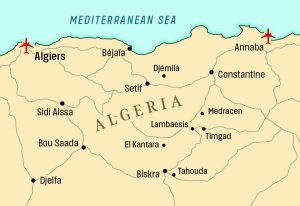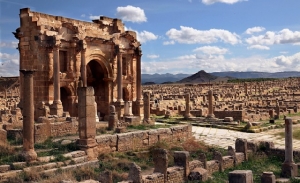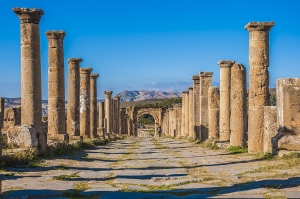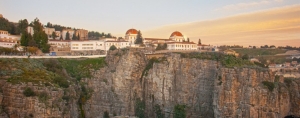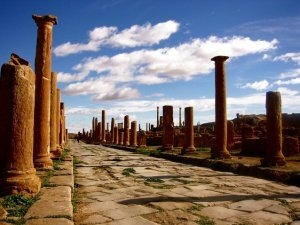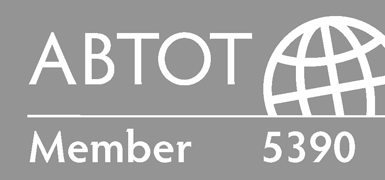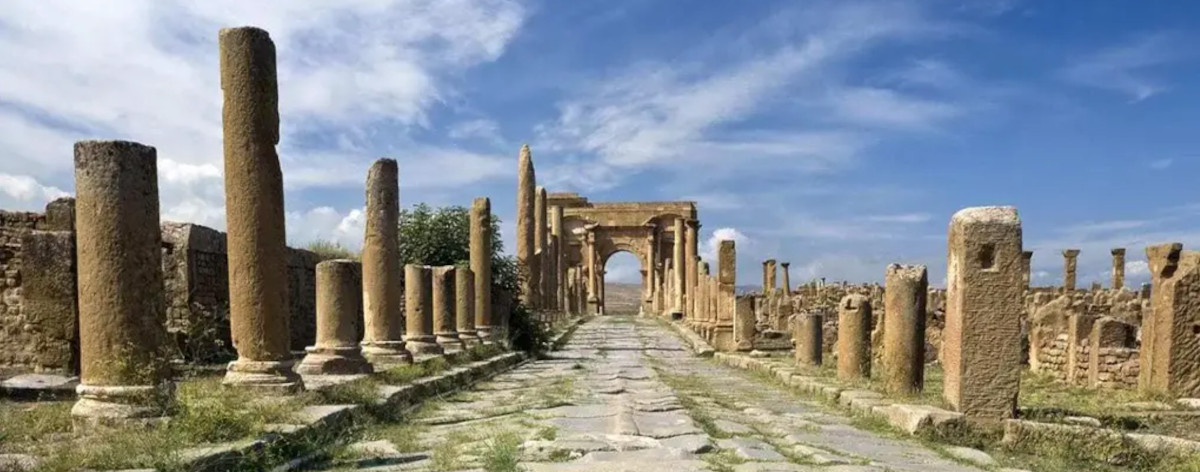
Classical Algeria
2nd - 12th November 2026
(11 Days)
Expert Historian : Dr Farès K Moussa
Contact us - use the button below to receive more information
Classical Algeria
Your Holiday Essentials
2nd - 12th November 2026
(11 Days)
Best available hotels, meals as indicated,
drinks with dinner, all entrance fees,
tour manager and expert historian
throughout, optional travel from UK.
Expert Historian: Dr Farès K Moussa
Incl. travel from UK: N/A
Interested in this tour but not ready to book? Register your interest using the link below and we will keep you updated on the progress of the tour.
|
|
Tour Introduction
Algeria is a relatively new destination, offering the adventurous traveller a different experience of the Roman Empire that relatively few dare take the chance to explore.
Compare the lavish life of the ancient coastal settlements of Tipasa, Cherchell and Hippo Regius, rich in trade and war, with the challenging remote life at the inland Roman outposts of Tiddis and Timgad. Walk the streets of the vast ruins of Djémila and see the startling mosaics from across the country, showcasing everyday Roman life in all its intimacy.
Explore the ancient cities of Constantine, the Roman capital Cirta, Anabba once home to St Augustine, and the modern vibrant capital of Algiers. Through a combination of museum visits, city walks and talks by our expert guide we get close to this fascinating past, with its wealth of Classical heritage, set against the backdrop of a bold and rapidly changing country.
There has never been a better time to immerse yourself in the rich and complicated history and culture of North Africa’s largest country. Algeria is waiting to be discovered - this is a tour not to be missed!
Background
Algeria, like most of North Africa, suffered a violent early period with Numidian turncoats and uprisings, betraying first their Carthaginian allies to the Romans, then the Roman Empire itself in 105BC before Rome re-established control. The decline of Rome in Africa made way for the Vandal conquest, the destruction of which can still be seen today, before the Christian Byzantines invaded, leaving behind beautiful basilicas and fortifications in the crumbling Roman cities. Finally, the Arab Conquest in the 8th Century irreversibly changed the culture and landscape of the country, arguably the biggest change until the war of independence from the French ending in 1962.
Algeria is known best in living memory for the bloody and brutal decade long civil war in 1992 following a period of extreme economic decline and public discontent, resulting in the death of up to 150,000 people. Since then, it has made significant democratic progress, ending the state monopoly over TV and Radio and officially recognising the Berber language in the constitution.
Each of these periods has left a treasure trove of ruins, architecture and artefacts behind to be discovered, showing the ingenuity and vibrancy of life in this diverse and demanding landscape.
Highlights
- Travel in the company of an expert archaeologist and North Africa specialist
- Visit amazing Classical sites at Lambaesis, Madauros, Khmissa and El Khroub
- Spend a whole day touring the spectacular Roman city of Timgad (Thamugadi)
- Capture the amazing North African city-scape and atmosphere of Constantine, known in Classical times as Cirte, and its rich history
- Enjoy Algeria’s excellent and seldom visisted museums including the Bardo in Algiers, the Musée Cirta in Constantine and the Setif Archaeological Museum
- Enjoy the stunning Mediterranean sites of Chercell and Tipaza
What's Included
- Best available accommodation
- Return flights from London (optional)
- Expert historians throughout providing a daily variety of talks, presentations and Q&A
- Dedicated Tour Manager
- Dinner parties hosted by your expert historians and tour manager
- The company of like-minded travelers
- Helpful and friendly travel advice
- Meals as indicated in the itinerary
- Two drinks i,e wine or beer at each dinner and a welcome drink on first evening
- Entrance fees for sites included in itinerary
- Tour information booklet
- Modern, comfortable, air-conditioned coach
Itinerary
Day 1. Arrival and Algiers: fly London – Algiers. Walking tour of Casbah. Hotel in Algiers - 2 nights. (D).
Day 2. Mauretania Caesariensis: today we travel west of Algiers to enjoy a trio of sites providing an excellent introduction to the historical context of this fascinating country. First we stop at the impressive Mausoleum of Mauretanie, a 2000-year-old monument, where King Juba II of Numidia and Queen Cleopatra Selene II of Mauretania Caesariensis were buried. We then move on to the lovely seaside town of Cherchell, capital of the Roman province of Mauretania Caesariensis, with its fine museum and ruins intermingled within the modern town. Our final stop is Tipaza where we marvel at Phoenician, Roman, Paleochristian and Byzantine ruins in an invigorating coastal setting above the crashing Mediterranean below. (B, L, D).
Day 3. Hippo Regius: today we fly from Algiers east to Annaba, a beautiful coastal city and natural harbour which attracted Phoenician attention. Known as Hippo Regius it was the home of the theologian Saint Augustine and, depending on flight times, we will be able to explore the ruins of this site. Hotel in Annaba - 1 night. (B, L, D).
Day 4. Madauros, Khemissa, El Khroub: an early start today as we leave the coast and drive inland through stunning hill country to visit some of the smaller yet most remarkable sites in the country. Our first call is the Roman veterans colony of Madauros, once home of Apuleius, author of The Golden Ass. We then move on to the Numidian site at Khemissa, taken over as a Roman settlement in the first century AD after a revolt against the Empire’s hegemony. We continue to El Khroub where we visit the remarkable tomb of the Berber Numidian king Massinissa (202-148 BC). It is then a short distance to Constantine where we check in to our hotel for 2 nights. (B, L, D).
Day 5. Tiddis and Constantine: this morning we travel the short distance to the hillside site of Tiddis (Castellum Tidditanorum) which has evidence of a particularly long and unusual occupation by successive civilisations - Libyan, Punic, Roman, Christian and Muslim. Here we view a group of bazinas – Numidian funerary monuments – and a Roman sanctuary to the god Mithras. We return to Constantine where the afternoon is free to enjoy exploring this remarkable city, named in honour of the eponymous Emperor, and third largest city in Algeria. Known as the ‘City of Bridges’ it is worth visiting the Pont Sidi M'Cid suspension bridge - above its own natural arch – and taking a ride on the exhilarating gondolas. (B, L, D).
Day 6. Djémila and Setif: today we drive to the Roman city of Djémila (Cuicul) set in a truly beautiful location on a rocky spur cradled by lush, wooded hills. Here we enjoy this well-preserved municipium with many civic buildings, temples, baths, houses and gates to wonder at. The perfectly proportioned ‘cardo maxiumus’ is framed by an exquisite arch which adds a special sense of grandeur to the site. The museum here has a remarkable collection of mosaics. We move on to Setif to view its archaeological park and outstanding Archaeological Museum within which are a further collection of stunning mosaics. Hotel in Setif - 1 night. (B, L, D).
Day 7. Medracen and Lambaesis: we start today’s amazing journey into the past by driving to the Medracen mausoleum, a prominent truncated cone rising above the farmland, which could date back as far as the 4th century BC. This may have been a royal mausoleum-temple of the Berber Numidian kings. We then continue to Lambaesis, a Roman military centre, the fortunes of which rose and fell in step with those of the Third Legion. The Great Fort here is one of the best-preserved military complexes in the Roman world. We continue to Timgad and our hotel for 2 nights. (B, L, D).
Day 8. Timgad – the edge of Empire: we spend a whole day at the outstanding Roman site of Timgad (Thamugadi), a UNESCO World Heritage Site, and consummate example of Roman town planning. The city was built from scratch as a military colony by the Emperor Trajan in 100 AD. Wandering its ordered streets offers a unique lesson in Roman order and symmetry which we can only marvel at, here at the edge of empire. Here we wonder at the imposing Arch ‘of Trajan’, built to impress then as it does now. (B, L, D).
Day 9. Biskra and Tahouda: we leave Timgad and drive south into ever arid landscapes and through the rocky Aures mountains. Here we pass by the incredible Balconies of Ghoufi, a series of dramatic rock formations overlooking an oasis, the levels of which include cave homes. We arrive in the oasis town of Biskra and check into our hotel. The afternoon is spent visiting the El Kantara gorge with its Roman bridge. Imaginative Roman soldiers of the Third Legion called the gorge Calceus Herculis (Hercules' Kick), a reference to the divine hero’s legendary strength. We then return to the stark site of Tahouda, at the very fringes of empire, and not fully excavated, where we get a feel for what life must have been like in this frontier landscape. Return to Biskra – hotel 1 night. (B, L, D).
Day 10. Algiers: fly Biskra to Algiers. This afternoon we visit the National Museum of Antiquities in Algiers with its rich collection of artefacts from the country’s Classical past. There is then free time to explore the captivating city of Algiers. Hotel in Algiers – 1 night. (B, L, D).
Day 11. Departure: fly Algiers to London. (B).
Recommended Reading List
- Classical Antiquities of Algeria: A Selective Guide
- Roman Conquests: North Africa
- Rome in Africa
- The Numidians 300 BC–AD 300
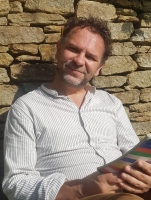
Dr Farès K Moussa
Farès is an anthropologist, archaeologist and consultant in heritage and arts/culture management, with a particular expertise in North African, Saharan and central Mediterranean Phoenicio-Punic, Amazigh (‘Berber’), Nuraghic (Sardinia) and Roman archaeology, as well as contemporary ‘folk’ Islamic practices. His portfolio career over the last twenty-five years has included numerous archaeological survey, excavation and heritage impact mitigation projects in the MENA region and Europe; and Directorships in several arts/culture organisations in the UK. He has been leading and lecturing on archaeological tours since 2006.
Farès read Anthropology and Psychology at the University of East London, Archaeology at University College London and University of Edinburgh; and was Marie Curie Fellow in the History of Thought at the École normale supérieure (Paris). He is particularly interested in the relationships people develop with material and visual culture, especially in ‘religious’ contexts; and how different human perceptions and understanding of the world are determined. He has several journal and chapter publications and is currently writing his first book based on his thesis (University of Southampton) about how human cognition underlies different types of relationship to material culture.
Your Holiday Essentials
2nd - 12th November 2026
(11 Days)
Best available hotels, meals as indicated,
drinks with dinner, all entrance fees,
tour manager and expert historian
throughout, optional travel from UK.
Expert Historian: Dr Farès K Moussa
Incl. travel from UK: N/A
Interested in this tour but not ready to book? Register your interest using the link below and we will keep you updated on the progress of the tour.
|
|

